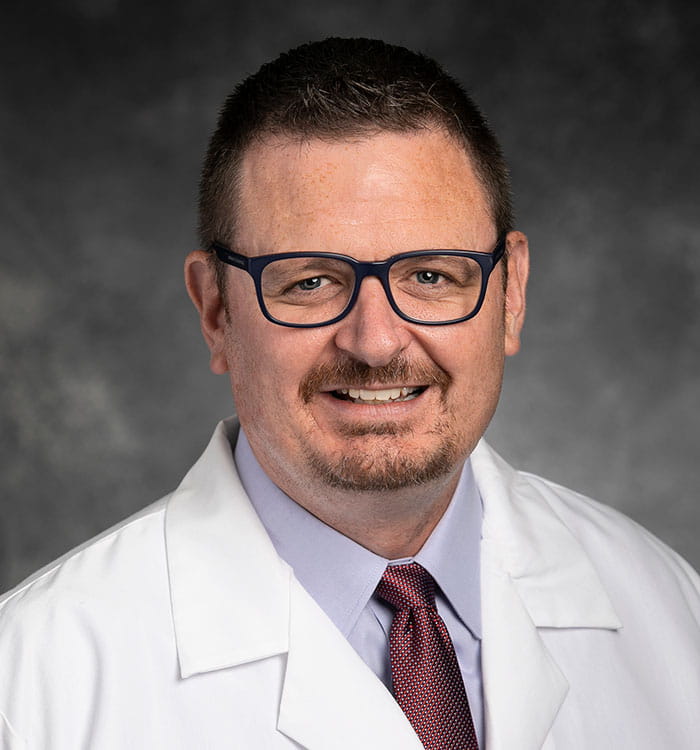Employing Precision Medicine in Sepsis Management
November 15, 2023
UH Cleveland Medical Center evaluating novel methods for more discerning diagnosis
Innovations in Pulmonology, Critical Care & Sleep Medicine | Fall 2023
Sepsis and septic shock are leading causes of death worldwide, so early diagnosis and treatment with antibiotics — ideally within an hour of recognition of sepsis — are critical. However, differentiating patients who truly have sepsis from those who don’t is not always easy. Furthermore, unnecessarily treating non-sepsis patients subjects them to potential side effects and increases antibiotic resistance, which is a significant public health issue.
 Kenneth E. Remy, MD
Kenneth E. Remy, MDTo that end, University Hospitals (UH) Cleveland Medical Center recently piloted an FDA-approved tool called SeptiCyte® RAPID, designed to help clinicians quickly and more accurately distinguish between patients who do and do not have sepsis. If effective, SeptiCyte will offer a new tool in the sepsis diagnostic armamentarium.
Kenneth E. Remy, MD, MHSc, MSCI, FCCM, The Ellery Sedgwick Jr. Chair and Distinguished Scientist in Cardiovascular Research, Director for Basic Science and Translational Research, Pulmonary Critical Care Medicine, UH Cleveland Medical Center, led this pilot study, in collaboration with UH pulmonary colleagues, Rana Hejal, MD, Xiaochun Susan Zhang, MD, and Layla Sankari, MD.
“SeptiCyte reports good fidelity in identifying sepsis versus non-sepsis,” says Dr. Remy, who is also an international expert member of the Surviving Sepsis Campaign. “It’s better than a lot of the nonspecific lab tests available. However, we are still analyzing the data to see how this tool can be best utilized.”
Diagnosing Sepsis is Not Always Straightforward
Dr. Remy says it can be challenging to discern whether a hospital patient truly has an infection, and clinicians must differentiate true sepsis patients — who need broad spectrum antibiotics — from those who have sepsis syndrome but not an overwhelming inflammatory response. Tools such as SeptiCyte may provide a simple yes or no answer to this important question.
“We have been reviewing the data and are planning a manuscript for publication soon once we see how this test can be precisely applied to the right populations,” says Dr. Remy. “If SeptiCyte looks promising from a data perspective, we’ll engage with the company to see how we could use it in clinical practice at UH. Simultaneously, our lab is working with SeptiCyte to best refine the type of blood samples that can be used and rapidity for turnaround time since time in sepsis is life.”
Antibiotic Stewardship
Quickly and effectively diagnosing sepsis and administering appropriate antibiotic and other therapy is critical to optimal patient care. However, judiciously managing the use of these life-saving medications is also a worthy goal.
According to the U.S. Centers for Disease Control, approximately 30 percent of the antibiotics administered in the U.S. are unnecessary or suboptimal, causing nearly 3 million antibiotic-resistant infections annually and more than 35,000 deaths. In these cases, antibiotics expose patients to side effects with no benefit and lead to antibiotic resistance. The CDC warns that antibiotic use can even negatively affect healthy people through the spread of C. difficile and other resistant organisms.
“One reason we’re excited about Septicyte is the possibility of using it to help with antibiotic stewardship,” says Dr. Remy. “Surgery and trauma, for example, both activate patients’ immune systems, potentially resulting in fever. However, some of these patients truly have an active infection and sepsis. Since every therapy may have side effects, we want to make sure we’re deploying those therapies appropriately and to those that need them.”
UH Cleveland Medical Center Leading International Discovery Efforts
Clinical evaluation of new techniques and novel tools is just one way UH Cleveland Medical Center is innovating to improve patient care and outcomes for sepsis. As part of Dr. Remy’s role on the Biomarkers group of the Surviving Sepsis Campaign, he is pushing clinicians to refine and develop these precision medicine tools — and he’s bringing them to UH.
“At UH, we are currently evaluating different products to see what we think would be helpful so we can further refine our ability to determine who actually has sepsis and to provide the right therapies,” Dr. Remy says. “I anticipate UH will be one of just a few sites leading this charge, and, while SeptiCyte looks promising, we’ll be evaluating other tests, as well.”
For more information about SeptiCyte or sepsis, call Dr. Remy at 216-855-8556.
Contributing Expert:
Kenneth E. Remy, MD, MHSc, MSCI, FCCM
Director, Basic Science and Translational ResearchPulmonary Critical Care Medicine
UH Cleveland Medical Center
Associate Professor of Medicine
Case Western Reserve University


